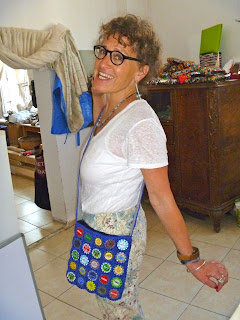 |
| Sailing in very gentle winds from Cesme to Eskifoca |
 |
| Ayvalik harbour front |
 |
| Greek church converted to a mosque |
We've been tied up at Ayvalik for longer than we ought to have been, given the horrible daily rates charged by Turkish marinas. This is as far up the coast as we're going now (we've abandoned Canakkale and the Gallipoli peninsula). On Monday, all going well, we'll peel off for the Greek island of Lesvos.
We were always going to come in here for a day or two so we could leave the boat and drive to Pergamon, the ancient ruins at Bergama, about 50 km south-east of Ayvalik. More about that in another post. I knew that Ayvalik was famous for its olive oil production (and that excited me), and that it used to a Greek town before the population exchange of 1922. It's a fishing town, obviously, its harbour sheltered behind the islands of the archipelago.
But what I didn't know was how mellow life is here, nor how much the Turks love the place. There's are few foreign tourists (compared to the south) but lots of Turks enjoying the place. They've built ugly holiday "villages", as they call their tree-less coastal developments, around the harbour, but from inside Ayvalik's narrow streets you don't see or sense these changes. It's a place for stopping a while.
 |
| A backstreet Ayvalik olive oil shop |
 |
| The top end olive oil shops are very fancy |
A chance encounter on a Turkish food blog pointed me towards Cop(m)adam, an experimental project in Ayvalik designed to give work to women who hadn't ever had jobs, and to recycle waste material. It pinged something in my famously bleeding heart, so off I went with my Google map. I walked past Cop(m)adam's shopfront probably three times before I saw it. "Everybody gets lost in Ayvalik," Tara Hopkins said, when I walked into her workshop and out of the late afternoon heat.
 |
| Cop(m)adam's workshop |
Tara sat just inside the door at a table covered with cats. The room was small. Five or six women were packing up their work. It was Friday, but nobody seemed in a hurry to leave. Women were chatting, comparing work, laughing. Did I want tea? No, I wanted to know. A huge thirst for information overtook me. What's happening here? Tell me quick.
 |
| Tara Hopkins and a bottle-top bag |
I could have stayed and picked Tara's brain for hours. A lively, politically-alert American who's lived in Turkey since 1989 - a journalistic goldmine! Civility prevailed however, and I took what information I was offered as an interested passer-by and left as tickled as an Alice who has fallen into wonderland.
In brief (and do check the Cop(m)adam link), this project is Tara's attempt to advance the "civil society" theory she's taught for years, most recently at Sabanci University in Istanbul, from another tactical vantage point. She used to train activists, but you do wonder, don't you, about fighting the system, and you do get tired. Why not trying working from the inside? At Cop(m)adam, she employs about 10 women full and part-time, and another 60 who work from home. Cop(m)adam's "garbage ladies" make bags, purses, embroidered work, funky accessories and so on from donated waste material. The goods are sold in boutiques in Istanbul, and on-line.
In behind the workspace is a largish room stuffed to the ceiling with bolts of cloth, plastic, leather, even a pile of donated parquet planking - "we don't know what we're going to do with that yet". She'll figure it out. She measures the growth of her project not just in sales. A condition of the pieceworkers' employment is that they must come into Cop(m)adam's little workspace one day a week. Tara's sub-text isn't subtle - get women out of their homes, and they will flourish, grow in confidence. "One of my ladies went out the other day and bought her first lipstick," she tells me. "Some ladies are buying bathing suits for the first time." That's counter-cultural. In Turkey, there's a big push from the top for women to cover themselves up. And they are. We see covered women, young and old, everywhere. From her quiet corner in Ayvalik Tara won't stop the traffic, but the theory is that from little things big things grow.
 |
| One of Tara's ladies - she's 73, devout, and proudly uncovered |
Ready for more ruins? They come next.











No comments:
Post a Comment